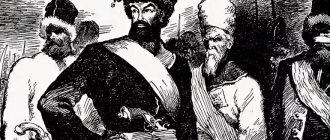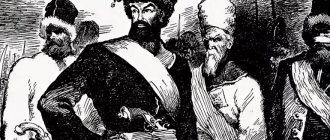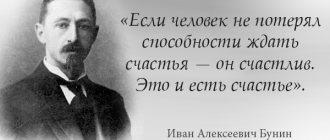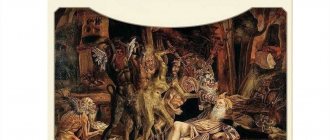And Pushkin is our everything: Pushkin is the representative of everything that is spiritual, special, that will remain our spiritual, special after all our collisions with strangers, with other worlds. Pushkin is so far the only complete sketch of our national personality, a nugget that took into itself, in all kinds of collisions with other features and organisms, everything that should be accepted, set aside everything that should be set aside, complete and whole, but not yet with colors, but only a sketched outline of the image of our national essence - an image that we will be shading with colors for a long time to come. The sphere of Pushkin’s spiritual sympathies does not exclude anything that happened before him and nothing that was and will be correct and organically ours after him. — A.A. Grigoriev “A look at Russian literature since the death of Pushkin.” 1859
Alexander Sergeevich Pushkin (May 26 [June 6] 1799 - January 29 [February 10] - great Russian poet, playwright and prose writer, critic and literary theorist, historian, publicist; one of the most authoritative literary figures of the first third of the 19th century. Pushkin is considered as the founder of the modern Russian literary language. Alexander Sergeevich is an amazing poet who is near and dear to every Russian person. We have known many of his works since early childhood. Pushkin is an extraordinary phenomenon and, perhaps, the only phenomenon of the Russian spirit: he is a Russian person in his development , in which he, perhaps, will appear in two hundred years. In him, Russian nature, Russian soul, Russian language, Russian character were reflected in the same purity, in such purified beauty, in which the landscape is reflected on the convex surface of optical glass. - N. V. Gogol “A few words about Pushkin”, 1832
Excerpts and quotes from poetic works
There is no happiness in the world, but there is peace and will.
Praise and slander were accepted with indifference and do not challenge the fool.
And the heart burns and loves again - because it cannot help but love.
He who has loved once will not love again.
A woman's love does not last long. The cold separation saddens her: Love will pass, boredom will set in, The beauty will love again.
And happiness was so possible, So close!
What happened will not happen again. Whatever happens will be nice.
You cannot harness a horse and a trembling doe to one cart.
Blessed is he who was young from his youth, Blessed is he who matured in time. It will always be as it was; This is how the white light has been since ancient times: There are many scientists - few smart ones, There are darkness of acquaintances - but no friend!
No no! It has passed, the destructive time, When Russia bore the burden of ignorance.
I feel sad and light; my sadness is light; My sadness is full of you.
Ah, it’s not difficult to deceive me!.. I’m glad to be deceived myself!
I loved you: love, perhaps, has not yet completely died out in my soul; But don't let it bother you anymore; I don't want to make you sad in any way. I loved you silently, hopelessly, sometimes with timidity, sometimes with jealousy; I loved you so sincerely, so tenderly, As God grant you to be loved differently.
There is no grace for you in anything; There is a discord with your happiness: And you are beautiful inappropriately, And you are smart inappropriately.
Frost and sun; wonderful day! You are still dozing, lovely friend - It’s time, beauty, wake up: Open your closed eyes towards the northern Aurora, appear as the star of the north!
If life deceives you, don't be sad, don't be angry! On the day of despondency, reconcile yourself: Believe, the day of joy will come.
The heart lives in the future; The present is sad: Everything is instant, everything will pass; Whatever happens will be nice.
Folk expressions
You should learn to understand figurative expression. For a better and deeper understanding, some of them should be examined.
- For example, hanging your nose. In other words, you can say “to be sad, to be sad.”
- Or drive a wedge. This expression can be interpreted as “to deliberately quarrel, create a quarrel between someone.”
- Speak hand in hand. That is, interfere with doing something or prevent you from concentrating.
- Or - give free rein to your tongue. In other words, talk a lot, speak out, tell something painful or, conversely, give away secrets and secrets.
- Give me a light. You can say: shout, punish, point out shortcomings.
- Look for the wind in the field. This means the following: irretrievable loss of something or someone with a hopeless outcome.
- Let’s look at the expression “break into pieces.” You can understand this statement as follows: try very hard to do something.
- For example, this expression: hand in hand. This expression is usually used to describe a happy married couple. They go hand in hand through life.
Phrases and excerpts from the novel “Eugene Onegin”
He who lived and thought cannot help but despise people in his soul...
They came together: Wave and stone, Poetry and prose, ice and fire.
The less we love a woman, the easier it is for her to like us, and the more surely we destroy her Among seductive networks.
Whom to love? Who to believe? Who won't cheat on us alone? Who helpfully measures all deeds, all speeches by our yardstick? Who doesn’t sow slander about us? Who cares for us? Who cares about our vice? Who never gets bored? A vain seeker of a ghost, Without wasting your labors in vain, Love yourself, my venerable reader! A worthy subject: there is nothing more amiable, it’s true.
You can be a smart person And think about the beauty of your nails:
Why argue fruitlessly with the century? The custom is despot between people.
.. I love you (why lie?), But I am given to another; I will be faithful to him forever..
He was loved... at least that's what he thought, and he was happy. A hundred times blessed is he who is devoted to faith...
But there is no friendship between us either. Having destroyed all prejudices, We consider everyone as zeros, And ourselves as ones.
Love for all ages.
We all learned a little Something and somehow, So with upbringing, thank God, It’s no wonder for us to shine.
A habit has been given to us from above: It is a substitute for happiness.
When you get old, life is so disgusting...
And a thought sank into my heart; The time has come, she fell in love.
Blessed is he who was young from his youth, Blessed is he who matured in time.
O people! You are all like the ancestor Eva: What has been given to you does not attract you; the serpent constantly calls you To itself, to the mysterious tree: Give you the forbidden fruit, And without that, paradise is not paradise for you.
Everyone fusses, lies for two, and everywhere there is a mercantile spirit. Yearning! Explanation of the quote: From what was not included in the novel
There is no return to dreams and years
I lined the shelf with a group of books, I read and read, but to no avail: There is boredom, there is deception or delirium; There is no conscience in that, there is no meaning in that; Everyone is wearing different chains; And the old is outdated, And the old are delirious with the new.
Figurative expressions in literature
A figurative expression summarizes various phenomena in people's lives. Such short sayings are passed down from generation to generation. The mode of transmission is not only an everyday form of communication, but also literary works. Various features in the environment, in the manifestation of any actions. For example, if you hurry, you will make people laugh. I picked up the tug, don’t say it’s not strong. Dear ones scold - they just amuse themselves.
Alexander Sergeevich Pushkin admired folk sayings, sayings, proverbs, which can also be classified as figurative expressions. “Oh, what’s the point! What gold!” These were the sayings of the Russian poet. Sholokhov wrote about this: “The greatest wealth of the people is language!” Folk expressions have accumulated over thousands of years, and they live in words.
In fact, such statements are a storehouse of wisdom of the people themselves. They very often express truths that have stood the test of time. Figurative words and expressions are often used in public speech; their use in the introduction or conclusion can be one of the ways of argumentation, but we should not forget that the use of statements of this kind depends on the relevance of the situation. In order for words to be expressive and images to be emotionally charged, figurative expressions are often used.
The fairy tale is a lie, but there is a hint in it... (about the fairy tales of A. S. Pushkin)
Here is a very interesting picture. It is drawn in such a way that we see at once the past, present, and future of the greedy old woman: here she is poor, here she is the queen, and the servants are chasing the old man around. But there is a goldfish flying left and right. It's a hint. It means that you and I are in a fairy tale and that the whole fairy tale is ahead, and wait, you wicked old woman, it’s too early to rejoice! And the exorbitant size of the fish compared to humans is also a hint: after all, we are dealing with a magical fish that can do anything.
I was drawn to Pushkin’s fairy tale all my life. And his first poem, which he completed as a twenty-year-old youth, “Ruslan and Lyudmila,” was a fairy tale. But when she appeared, she was not greeted with enthusiasm by everyone. In 1820, when excerpts from “Ruslan and Lyudmila” appeared in print, an article entitled “Letter to the Editor” was published in one of the magazines. Proving that “Ruslan and Lyudmila” is “rude”, “peasant” poetry, which should not be allowed into the society of “noble” people, the critic wrote: “But spare me the details and let me ask: if the Moscow Noble Assembly as “Someone… a guest with a beard, in an overcoat, and bast shoes would rub in, and would shout in a loud voice: “Great, guys!” Would they really admire such a prankster?” The picky critic was irritated by the fact that the poem was written in simple language, close to genuine folk speech, and that “Ruslan and Lyudmila” contained motifs from Russian folk tales, which he, like the “common people” themselves, treated with disdain. And he was not alone. Poor critic of “Ruslan and Lyudmila”! Composing his menacing message about “a guest with a beard, in an army coat, in bast shoes,” he had no idea what awaited the “noble public” ten years after “Ruslan and Lyudmila.” Just listen to what Pushkin composed in 1830:
Once upon a time there was a priest with a thick forehead. The priest went to the bazaar to look at some goods. Balda goes towards him, not knowing where...
A man really appeared in poetry - both in an army coat and bast shoes, and even named Balda! And it was written in a language that previously was considered indecent to allow even close to poetry - in folk language, bright, rich, expressive, sometimes even rude:
Balda walks by, grunts, And the priest, seeing Balda, jumps up, hides behind the butt, squirms in fear...
It was as if the Russian, colorful, vociferous, had broken into the smooth parquet of poetry in a noisy gang. They broke in wearing bast shoes, army jackets, and just barefoot. It broke in, violent and crafty, daring and simple-minded, sweeping and uncontrollable in joy and sadness. And the parquet floor crackled, and there was a smell of the market, and bread, and the blue sea, and the Russian spirit. This is how Pushkin's fairy tales began. True, they described not only men and women, but also kings and princesses; but these kings and princesses were very much like ordinary, simple people. After all, for the folk tale, both Ivan the Tsarevich and Ivan the Fool are all the same; if he were a good person... Remember the fairy tale about the dead princess and the heroes? The princess in it is very similar to a modest, hard-working village girl: once in the house of the heroes, she did not sit idly by, but began to cook and clean. And Tsar Saltan, who overheard the conversation of three girls, hiding “behind the fence”? After all, he walks around his kingdom, like a man looks around his house and yard. And Prince Guidon with his simple speech? “Prince Guidon then jumped up and shouted loudly: “My dear mother! You, young princess! Look there: the priest is coming here...” And here is the old woman from “The Tale of the Fisherman and the Fish.” An ordinary, grumpy old woman. But who can say that another stupid and evil, but still a real queen, could not come out of her? Look how she disposes of the old man, how, having become a queen, she beats and “drags” her servants by the chuprun! The tales caused almost universal discontent. Once again Pushkin was not understood, again he overtook his readers. He, before many others, realized how much beauty and truth lies in folk tales and songs. And, having risen to the pinnacle of his fame, he wanted to get closer to the simple wisdom of a folk tale. It was very difficult. After all, fairy tales have been created for centuries; the entire Russian people created them. Pushkin was supposed to contain centuries, the experience of the entire people. And he succeeded. Not all of his tales are as similar to real folk tales as “The Tale of the Priest and His Worker Balda,” but the people accepted and loved all of these tales. Not only do we all read them and know them from childhood; Even before the revolution, when the village was illiterate, Pushkin’s fairy tales - sometimes in a distorted, altered form - were told in the villages, passed on from mouth to mouth. The people seemed to recognize these tales as their own. And how could one not admit it, if everything in them is so beautiful and simple - both the characters and the events - if every line asks to be remembered:
The wind blows across the sea and propels the boat; He runs in the waves on swollen sails.
Or more:
An old man lived with his old woman by the very blue sea; They lived in a dilapidated dugout for exactly thirty years and three years. The old man was catching fish with a net, the old woman was spinning her yarn.
Isn’t it true - as if all this was composed easily, at once, without any effort, as if the words themselves flowed onto Pushkin’s paper? He wanted - and then a soul-stricken chant poured out, as in a sad folk song:
He waits and waits from morning until night, Looks into the field, and sometimes his eyes are sore, looking from the white dawn until night, Not to see his dear friend! He just sees: a blizzard is swirling, Snow is falling on the fields, The whole white earth...
He wanted to - and there was a leisurely, detailed conversation, a simple story:
She was given one mirror as a dowry; The mirror had this property: It could speak...
He wanted to - and lines, words, even syllables began to play with each other, dance mischievously, clicking their heels and slyly calling out to each other:
She didn’t kill me, she didn’t tie her up, she let her go and said...
She went up to the porch and took hold of the ring...
I lit a candle for God, I lit the stove hot...
They sat me down in a corner and brought me a pie...
How beautiful and simple! It's actually not that simple. It was difficult to achieve such beauty and such simplicity. But Pushkin was not only a great genius, but also a great worker. He often worked for a long time on each line. And if he had decided to simply write a fairy tale, like two peas in a pod similar to a real folk tale, then, quite possibly, no one would criticize or scold him. Everyone would have decided that the “famous singer” decided to relax and have fun - and in his spare time he copied a folk tale, joked, played pranks... Who forbids a genius to fool around? But what they could not understand and forgive was the fact that Pushkin took fairy tales very seriously. So seriously that he began not to copy the folk tale, but to remake it, giving it new depth, or, rather, revealing those depths that are in the folk tale, but which superficial readers could not see. You yourself know: a fairy tale never pretends to be reality. She never says: well, all this really happened. The storyteller, as it were, agrees with the listeners that he is telling a fable that takes place “in a certain kingdom, in a certain state,” and even, say, “under Tsar Pea,” which, we know, never existed. And people in fairy tales are not at all the same as in life. There are a lot of different traits and characteristics in the character of a living person. And the hero of a fairy tale most often has one or two traits, the most important ones, necessary for action. The owner, for example, is stinginess and stupidity. Worker - cunning, ingenuity, strength. Ivan Tsarevich - courage, willingness to help the weak. Ivanushka the Fool is an eccentric, a simpleton who is lucky in life. Pushkin's people are not like that at all. It was as if he had sprinkled them with “living water”, and they became just like alive. Here, for example, is the old man from “The Tale of the Fisherman and the Fish.” At first glance, he is very similar to Ivanushka the Fool, only unlucky. His kindness, simplicity, and selflessness seem to reach the point of eccentricity. In fact: the fish offers him a ransom, but he refuses! But, it would seem, what’s bad or complicated here: let the fish go and ask it for something, because it doesn’t cost it anything! But no, I didn’t guess - “so he let her into the blue sea.” And not only did he let him in, but he also told his greedy and grumpy old woman and got himself into trouble. Some kind of offensive bungling. And in general, when reading a fairy tale, sometimes you feel not only pity for the old man, but also some kind of vague annoyance at his resigned patience and almost slavish obedience. Why does he keep walking and walking back and forth, why, at the first request of the old hag, does he habitually drag himself to fulfill her whim? Why does he obediently, like an echo, repeat the old woman’s words: “... ours is completely split”? But here's an interesting thing. The entire tale is written without rhyme, in so-called “blank” verse. And suddenly:
God bless you, goldfish! I don’t need your ransom; Go to the blue sea, take a walk there in the open space.
Rhyme! Why did she appear here? Here's why. Against the background of unrhymed verses - listen for yourself! – the rhyme sounds especially beautiful and solemn. The “kind word” that the old man said to the fish, thanks to the beautiful rhyme “sea - open space”, begins to sound sublime and majestic. Pushkin, as it were, makes us understand that, faced with a “great miracle,” the old man involuntarily, without knowing it, said something unusual, lofty, and beautiful. He felt that in front of him was not just a strange, talking fish, but a mysterious representative of the powerful, free and beautiful elements of the sea... If he was afraid of this miracle, it was only a little. He simply talks to the fish respectfully, as if he were a strong and good person: “Have mercy, lady fish! Again my old woman is rebelling, giving the old man no rest...” The old man seemed to have found a common language with the fish; There is some kind of mutual understanding, some kind of intimacy between them. So look now: is this just an unrequited eccentric who can be stripped of his last shirt with impunity? No, this is a wise and naive poet. Where a callous, boring, selfish person sees simply water, sand, fish, even extraordinary ones, the old man sees the greatness of nature, beauty, miracle. And this is more important to him than any ransom. They don’t take ransom from miracles, just as they don’t take it from beauty and joy.
The tale of the Golden Cockerel is dark and mocking. The three sons of King Dadon die one after another, and here he is: feasting in the tent of the treacherous Shemakha queen. This drawing is also beautiful and also unusual. Look: almost the entire fairy tale on one sheet of paper! And it is told not in words, but in a string of scenes. This is what makes the drawings so unusual: hints, emphasis on the main thing and many actions in one drawing.
That's why - not out of fear! “I didn’t dare take a ransom from her,” says the old man. “You didn’t know how to take ransom from a fish!” - the old woman yells at him. This one is a completely different person. She is one of those people who, when faced with something unfamiliar and surprising, have neither the time nor the desire to be surprised or admire. After all, there is no use in surprise, there is no “self-interest”, there is no benefit. And people like the old woman, first of all, look for the benefit in everything, from everything, even from a miracle, they strive to quickly grab the fattest piece. They are in such a hurry to do it that they don’t even think well in their haste. After all, what was it worth for the old woman from the very first time to wish not for some unfortunate trough, but immediately for the royal title? But no, out of greed she didn’t even realize it. Only then does she gradually get the taste, and the further it goes, the more she wants to grab and grab. And in the end, we notice that the old woman no longer needs property, not wealth, but strength and power over other people, the opportunity to humiliate others and mock them, enjoying her power. Let's remember Balda. Pushkin changed the folk tale here too. In folk tales, such a worker as Balda (or more often Ivanushka) took revenge on the stingy owner by taking all his goods for himself. Pushkin's Balda is disinterested: he doesn't need anything from the priest, he, a poor man, only wants to punish him, show off over him - rich, strong, arrogant and greedy. And we sympathize with Balda. But tell me, when Balda rewards the priest with his terrible “slits” (from which “the priest lost his tongue” and “knocked out the old man’s mind”), don’t you really feel at least a little sorry for the priest? After all, Pushkin made this priest a completely alive person. Don't you feel annoyed at Balda for his cruelty? After all, he can kill the old man (it is not by chance that Pushkin inserts this word here - “old man”).
These illustrations were made by the artist M. Kuznetsov, who loves and knows Pushkin well, and he also loves and knows Russian popular print... In the old days, stories in pictures were sold at fairs and other auctions. They were eagerly bought up, especially by village people, and hung in huts for beauty. These drawings were first cut by the artist on a thin bast board, and then printed from the board onto sheets of paper, hence the name - bast. Along with nameless poets who wrote songs, fairy tales, and sayings that are still in use today, nameless self-taught artists, often surprisingly talented and inventive, lived among the people and worked. They created the popular print, which made it possible for an illiterate person to understand and remember a whole story, funny or edifying. There were popular print calendars, fairy tales, even travel stories.
Something similar happens to the old woman. When she was poor and unhappy, one could feel sorry for her. But as soon as she received strength and power from the fish, as soon as she rose “from rags to riches,” she immediately wanted to show off both the old man and even the fish itself, which gave her this power. For this she was punished, left again with her broken trough. She is punished because, having become a queen, she did not become a person, but remained greedy, petty, grumpy and envious (you must agree that an evil queen is much worse than just an evil and contentious old woman). It’s painful and creepy to see such traits in people. But Pushkin understands that, in spite of everything, there is a lot of beauty in life and in people. He creates “The Tale of Tsar Saltan” - a cheerful, serene, joyful tale about how father and son, despite the machinations, find each other. He writes “The Tale of the Dead Princess and the Seven Knights” - a poem about the wonderful omnipotence of loyalty and love. He writes the magical, mysterious “Tale of the Golden Cockerel,” in which he mercilessly punishes the stupid and ungrateful king, who does not keep his promises and is not true to his word. He creates a fairy-tale world - a world of goodness and justice.
As literacy and printing spread, lubok gave way to books and newspapers, then it was completely forgotten, as something unnecessary, outdated and crude... After all, even before Pushkin, some part of the reading public had a very disdainful attitude towards folk tales, but Pushkin is about that you already read in our story - I saw wondrous beauty in a folk tale, updated it, and it began to live again. The same thing happened with lubok: artists who love folk art brought it back from oblivion. And now you see how on our pages the fairy tale again met with popular print, also, of course, updated, because M. Kuznetsov was an artist of our time. Lubok and fairy tale, look, it’s as if two parts of one mechanism were found - so everything coincided and worked as it should: cheerfully, slyly, brightly.
In fact, look: it really is a whole world. This world has its own land, where kings and men, grumpy women and dull priests, governors and heroes live. And even hares, wolves, squirrels, dogs, gray ducks. Moreover, unknown foreign people - “Sorochins”, Tatars, “Pyatigorsk Circassians”. Moreover, some mysterious life “beyond the sea” (“Is it good or bad beyond the sea” - “Life is not bad beyond the sea”). Here there is a sea of its own, also densely populated - with fish, devils, heroes. And it changes from fairy tale to fairy tale, like from weather to weather. Sometimes it is calm, colorless and indifferent - you can even “wrinkle” it with a rope. It is a joyful blue element, bringing happiness, connecting, not dividing people, carrying cheerful boats. And its waves are like living ones: they can obey the request and throw a barrel with poor prisoners ashore and “quietly” flow away... But here is another sea - the mysterious, formidable and fair power of the small and mighty Goldfish... Here is their own heaven, in which the sun lives and month; the sun is polite and gentle, the month is also quite friendly and courteous, although somewhat cold: “I have not seen the red maiden. I stand on guard only in my queue. The princess apparently ran away without me...” Here, finally, is its own universe:
The stars sparkle in the blue sky, the waves lash in the blue sea; A cloud is moving across the sky, a barrel is floating in the sea. Like a bitter widow, the queen cries and struggles within her; And the child grows there Not by days, but by hours.
There is a whole world in these lines alone: sky, sea, nature, people. And even though this world created by Pushkin is fabulous, everything in it is full of life and truth. There may not be devils or talking goldfish in the world, but the beauty of this world is genuine, human feelings are true, thoughts are wise - both joyful and bitter - which Pushkin saw in ancient folk poetry and embodied in light and beautiful verses. That is why he concludes his last tale about how the arrogant King Dadon was punished with meaningful words:
A fairy tale is a lie, but there is a hint in it! A lesson to good fellows.
Take the fairy tale seriously, as Pushkin seems to say. She teaches us to understand life, teaches us to see good and evil in it, teaches us to defend goodness and fight against anger and injustice. By the way, the censors deleted this malicious folk joke from The Tale of the Golden Cockerel. They didn't want to take fairy tales seriously. Or maybe they were afraid...
Drawings by M. Kuznetsov.
By the fireplace
There are a large number of fairy tales in the world, and each story is a story about simple human values that will always be in fashion. It’s always nice to return to fairy tales, no matter how old a person is. You can find many amazing things in these stories, and each time it becomes unclear how you could not notice them at first. Sometimes it seems that fairy tales grow up with us. You can re-read the same work every five years and constantly find new sayings, episodes, and advice.
Although, if you think about it, it’s not the content that changes, but us ourselves. Based on the accumulated life experience, a person interprets individual fragments in his own way. He pays more attention to some, less to others, and does not notice others at all. And only when you are completely old, having gone almost to the end of your life’s journey, is it worth sitting down by a hot fireplace and re-reading your favorite fairy tale for the last time. Just like in the first one, it will again open the door to the magical world for a person, where he will imagine himself as a noble knight, a kind wizard or a beautiful princess. And again he will enter into battle with monsters and dragons only visible to him.
Fairy tales are like that - first they open up a world of magic to you, and then they teach you wisdom. And if a person adequately learns all the proposed lessons, then the entrance to the fairy-tale world will always be open to him. It’s just a pity that when we stop believing in fairy tales, we forget that the world on the other side of the magic doors is a reality that we ourselves can create.










